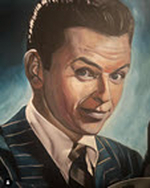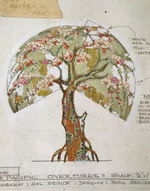Essential elements of the "Golden Age" sound
#25Essential elements of the
Posted: 5/27/19 at 10:15am
I agree that Oklahoma is much more integrated than Show Boat, but in almost every other way Show Boat is a much grander musical. PoisonIvy covers most of the areas of innovation in Show Boat, including the insight into the the way that the evolution of the music itself is displayed. The score itself contains the great anthem that brought tears to the eyes of Martin Luther King.
My question is why Show Boat became so untidy. In the Hal Prince revival the dirge "Mis'ry's Comin' Aroun" sets the tone for the first act. I've read that Kern feared the removal of the song and insisted that it be included in the overture.
How is it that the creatives had so little influence on the finished product? Was it because Ziegfeld was the initial producer and he had the final say and he was not at all accustomed to having very dark songs in his productions? The second, or perhaps the first most influential Show Boat production was the highly successful 1951 MGM film produced by Arthur Freed. MGM did not like to be tied down in its adaptations of Broadway musicals. Marge and Gower Champion were an act that merited two full dance numbers. Magnolia and Gay on their re-introduction had to be young enough to have a second chance and Julie -- well still not much hope for Julie.
I suppose that if the rocky course followed by Show Boat was primarily the result of strong-willed producers, there would be no need for a doctoral dissertation.
I was excited about the arrival of the Prince revival, and took from the library John McGlinn's three disk album of every song ever written for a Show Boat production. It features Frederica von Stade and Dawn Upshaw. So many songs, so little time.
A director contemplating a Show Boat revival has many decisions to make with respect to the songs to be used and the direction that the second act will take. This all comes back to Gaveston's thought that Show Boat was not a tightly integrated musical compared to Oklahoma and more work had to be done. I would just suggest that the musical would have been more tightly integrated if composer and lyricist had had their way. I suppose that the shows named by Someone in a Tree could be thought of as musicals along the path from Show Boat to Oklahoma, but were mostly not of the same quality of Show Boat and Oklahoma, and are not included in discussions.
#26Essential elements of the
Posted: 5/27/19 at 8:00pm
The singing style was different in the Golden Age because it had to be. There were no microphones so actors had to project. Today, as long as sound mixers are doing their jobs, everything everyone does will be heard so vocal stylings can be very different.
I don't agree that all of the singing was coarse and harsh; that's hardly accurate. However, and differing from operetta, which preceded the Golden Age, actors who could also carry a tune became a valuable commodity, i.e., 'character voices'. Operetta emphasized vocal beauty whereas the musical comedies and musical plays of the Golden Age emphasized character and story. I don't think that was a bad thing at all because many of those less-than-perfect voices were actually quite wonderful and full of texture for the roles they played.
#27Essential elements of the
Posted: 5/27/19 at 8:07pmSo if the 16 years between SHOWBOAT and OKLAHOMA were so fallow, all the more reason to not consider them part of the Golden Age imo.
#28Essential elements of the
Posted: 5/27/19 at 8:24pm
I think the BARITONE is an essential part of Golden Age sound. I think the era of the Golden Age musical was a golden age for baritones. In the operatic arena stars like Leonard Warren, Lawrence Tibbett and Robert Merrill were big deal moneymaking stars in a way operatic baritones today are not. In the pop world the biggest male stars were baritones like Frank Sinatra or Elvis Presley.
So Alfred Drake, John Raitt, Howard Keel, Gordon McRae, those are the kind of voices I associate with the Golden Age sound.
#29Essential elements of the
Posted: 5/27/19 at 8:30pm
Someone in a Tree2 said: "I can count one hand the shows of that era that could stand up today (GIRL CRAZY, ANYTHING GOES, PORGY AND BESS, ON YOUR TOES, PAL JOEY, LADY IN THE DARK"
Could they really be produced successfully with their original books/scores/orchestrations today? (That's not a loaded question, genuinely wondering.) Three have been rewritten to death (Pal Joey, Anything Goes, Girl Crazy became Crazy For You), Porgy can survive in an opera house but was rewritten for Broadway, and On Your Toes and Lady In The Dark's recent City Center productions didn't make the case for them as major works.
"I feel the Golden Age ends somewhere around 1965 with FIDDLER. The next year begins the era of the ascendant Concept Musical, typified with CABARET, I DO I DO, and THE APPLE TREE, and the start of the halcyon years of Kander & Ebb/ Sondheim and Prince."
I like the idea of ~1967-1979 being "The Concept Musical Era." Because the term applies to so many other shows from that time (Hair, Pippin, A Chorus Line, Runaways, Chicago, etc). You could argue that Evita is both the end of the Concept Musical Era and the beginning of the Megamusical Era.
#30Essential elements of the
Posted: 5/28/19 at 1:54pm
I keep looking at this thread and trying to put into words one thought I keep having- that the "Golden Age" is temporal on paper but sometimes seemed to travel with the authors working in that era. For instance, when Jerry Herman wrote "La Cage" in the early 1980s, it's hard to say he was writing a Golden Age throwback- Jerry Herman WAS the Golden Age, and he's writing the way he always wrote, successfully and without nostalgia, despite being temporally removed from the time when that music was the norm and not an exception.
Similarly and more complicatedly, Kander and Ebb. Their big shows fall solidly within the concept musicals era and well, WELL beyond, but it's not until the 1990s that their music began to leave the Golden Age roots that had defined their signature style since the early 1960s.
Videos







